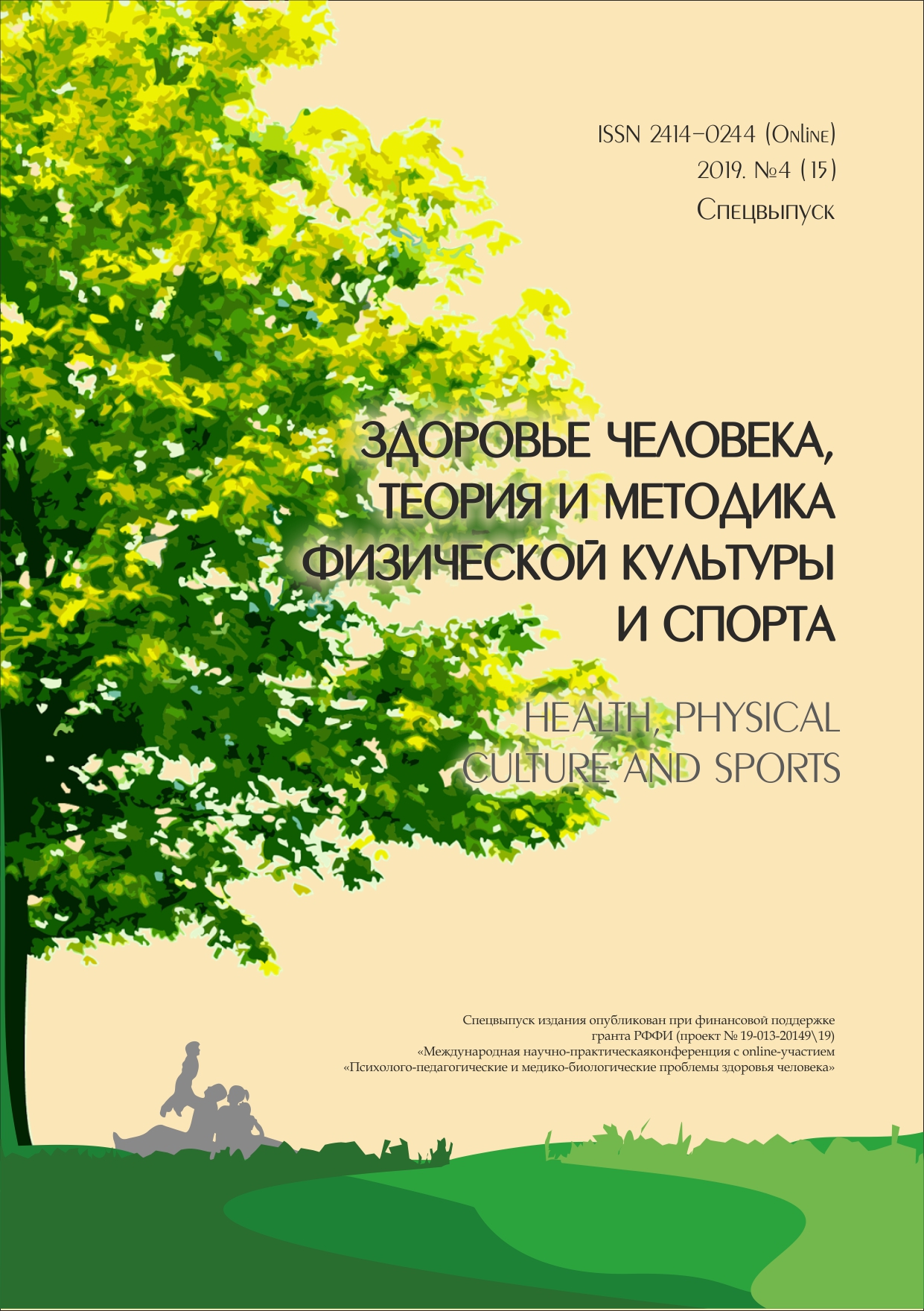FEATURES OF THE CONCENTRATION OF ATTENTION OF STUDENT ATHLETES DEPENDING ON THE ORGANIZATION OF THE DAILY REGIME
Abstract
This article presents a study on the relationship of concentration and daily regimeamong students of the Ural State University of Physical Education in conditions of combinedphysical and mental loads. As an argument of relevance, studies of doctors, psychophysiologists, andeducators are given. The purpose of the research is to study the characteristics of concentration instudent athletes depending on the organization of the daily regimen. A psychophysiological studywas conducted in the 2018–2019 academic year. 99 students took part in the survey, the average agewas 19.19 ± 0.15 years, of different levels of sports qualification (masters of sports — 7, candidatesfor masters of sports — 19, 1 category — 15, 2 category — 13, 3 category — 6).The results of the proof test — the Toulouse-Pierre test were the basis for the distribution ofstudents. Five groups showed accuracy indicators for express methodology: 62.62 % showed highaccuracy, 22.22 % good, 10.11 % normal, 4.04 % low accuracy and 1.01 % pathology.For studing the influence of the day regimen on attention stability, we studied the time allottedto social networks and instant messengers and night sleep on weekdays, the analysis was carried outaccording to the results of a widespread survey using Google Forms. In the researching group, 27.28 %of student athletes spend more than six hours a day on social networks and messengers, 36.36 %of respondents indicated 4–5 hours, 2–3–34.34 %, and 2.02 % — less one hour. The linear Pearsoncorrelation coefficient was r = –0.023. 12.12 % of students noted that night sleep lasts 3–5 hours, 41.41 % on weekdays sleep 5–7 hours,44.45 % — 7–9 hours, 2.02 % of respondents indicated that they have a night sleep more than 9 hours,the linear Pearson correlation coefficient was r = 0.13.Students-athletes who showed low results in the accuracy of the Toulouse-Pierre test are includedin additional psychophysiological studies as part of student health monitoring conducted at theOlympic Sports Research Institute.The research will be continued in the aspect of studying the effect of immersion in the media onthe duration of night sleep, as well as the development of recommendations for correcting the regimeof the day, taking into account all the features of training at a university of physical education
Downloads
References
Лобанов А. А., Попова О. В. Внимание человека: психофизиологические аспекты в норме и при нарушении // Международный студенческий научный вестник. 2017. № 1. С. 9.
Чипышев А. В., Хажеев Д. В. Влияние психоэмоционального тренинга на динамику психофизиологических показателей спортсменов на разных этапах подготовки // Наука и современность. Биологические науки. 2012. № 19–1. С. 21–25.
Коровин В. А., Викулов А. Д., Турчанинов С. Ю. Показатели внимания и текущее функциональное состояние организма юных спортсменов // Ярославский педагогический вестник. 2008. № 4 (57). С. 116–121.
Сунцов С. А. Характеристика свойств внимания спортсменов-единоборцев 12 лет // Вестник Северного (Арктического) федерального университета. Серия: Естественные науки. 2013. № 2. С. 96–101.
Давыдов В., Манкевич А., Лущик И. Концентрация и распределение внимания в спортивном плавании, спортивной и художественной гимнастики // Фізичне виховання, спорт і культура здоров’я у сучасному суспільстві. 2016. № 1 (33). С. 107–113.
Кондратович С. В. Оценка психофизиологических характеристик футболистов 12–13 лет в стандартных лабораторных условиях // Наука и спорт: современные тенденции. 2017. Т. 17, № 4 (17). С. 10–16.
Харина И. Ф., Звягина Е. В., Быков Е. В., Макунина О. А. Особенности психофизиологических показателей студентов с признаками дефицита внимания в условиях сочетанных умственных и физических нагрузок // Вестник Новосибирского государственного педагогического университета. 2018. Т. 8, № 3. С. 181–197.
Гришкевич М. С., Харина И. Ф. Изучение концентрации внимания у студентов-спортсменов разного уровня спортивного мастерства // Дневник науки. 2018. № 11 (23). С. 9.
Быков Е. В., Макунина О. А., Коломиец О. И., Коваленко А. Н. Организация мониторинга состояния здоровья студентов в Уральском государственном университете физической культуры // Научно-спортивный вестник Урала и Сибири. 2017. № 1 (13). С. 3–9.
Звягина Е. В., Харина И. Ф. Интегрированный аспект изучения синдрома дефицита внимания и гиперактивности: анатомо-морфологический и психолого-педагогический ракурс // Научно-педагогическое обозрение. 2016. № 2 (12). С. 46–51.
Ясюкова Л. А. Оптимизация обучения и развития детей с ММД. Диагностика и компенсация минимальных мозговых дисфункций: методическое руководство. СПб.: ГП ИМАТОН, 1997. 80 с.
Харина И. Ф., Звягина Е. В., Быков Е. В., Макунина О. А., Гильмутдинов Э. Р. Самооценка увлеченности социальными сетями и мессенджерами студентов вуза физической культуры // Научно-спортивный вестник Урала и Сибири. 2017. № 4 (16). С. 62–71.
Макунина О. А., Быков Е. В., Коломиец О. И., Якубовская И. А. Режим дня студентов в условиях сочетанного влияния умственных и физических нагрузок // Научно-спортивный вестник Урала и Сибири. 2018. № 1 (17). С. 50–55.
An author should not normally publish manuscripts describing essentially the same research in multiple journals or publication venues. Such redundant publication is generally considered to constitute unethical publishing behavior, and if discovered may result in a manuscript under consideration being rejected, or a published article being retracted.
Authors of manuscripts reporting on original research should present an accurate account of the work performed, accompanied by an objective discussion of its significance. Underlying data should be represented accurately in the manuscript. The manuscript should contain sufficient detail and references to permit others to replicate the work. The fabrication of results and the making of fraudulent or knowingly inaccurate statements constitute unethical behavior and may be cause for rejection or retraction of a manuscript or published article.





